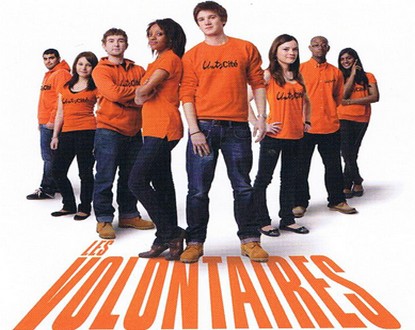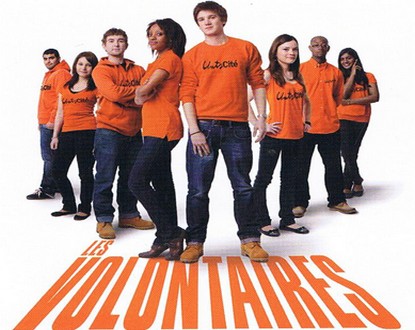The Civic Service was created by the law of March 10, 2010.
Its ambition is to offer an entire generation the opportunity to engage, to contribute time to the community and to others.
The Civic Service also aims to strengthen national cohesion and social diversity.

In 2010, the Civic Service mobilized 10,000 young people. The increase in the Civic Service is planned over 5 years to reach 75,000 young people by 2014. Two months after the law was enacted, the Civic Service Agency was created.
The fundamental principles of the Civic Service
For young people, the Civic Service is:
• The opportunity to experience formative and rewarding experience
• A voluntary commitment for all young people from 16 to 25 years old
• For a period of 6 to 12 months, with a weekly mission duration of at least 24 hours
• To carry out a mission of general interest recognized as a priority for the Nation
• Entitles the participant to a stipend covered by the State
• Provides access to a complete social protection scheme financed by the State
For the host structures, the Civic Service facilitates the management of volunteers: it is open to associations, local authorities, public institutions, foundations (non-profit), federations, unions, mutuals, and endowment funds. The procedures for approval are simplified: only one approval will now be required to host volunteers in Civic Service and benefit from state aid. The compensation for volunteers is paid directly by the State without passing through the host structures.
The volunteer’s compensation
A Civic Service volunteer receives between €540 and €640 per month:
The volunteer receives: a monthly allowance of €440 net/month, funded and directly paid by the State + €100 paid by the host structure (in kind or in cash corresponding to transportation or food costs) + an additional allowance of €100 paid by the State on social criteria (this measure concerns young people who benefit from or belong to a household that benefits from RSA, or holding a scholarship of higher education at the 5th level or beyond).
Moreover, the State covers the entire cost of the volunteer’s social protection (€377) for various risks as well as the payment of an additional fraction of the retirement contribution for the stipend to allow the validation of the entire service period.
Other actors of the Civic Service:
While Unis-Cité, a pioneering Civic Service association, inspired this system, other actors are also involved in France:
• AFEV: Volunteers from the Association of the Student Foundation for the City act for educational support in neighborhoods. Volunteers participate in the development of projects, recruitment, and coordination of volunteers.
• French Red Cross: Volunteers intervene in the main missions of the Red Cross in local delegations: prevention, the elderly, disability…
The Civic Service Agency is a Public Interest Group (GIP) created in May 2010.
The Agency brings together the State, the National Agency for Social Cohesion and Equal Opportunities (Acsé), the National Institute for Youth and Popular Education (INJEP), and the France Volunteers Association.
The Agency is chaired by Martin Hirsch.
Its mission is to:
- Define the strategic directions and priority missions of the Civic Service;
- Manage the approvals and financial support provided by the State for the reception of volunteers in Civic Service;
- Promote and enhance the Civic Service, particularly among the concerned public, host and orientation organizations for young people, educational institutions, and professional branches;
- Ensure equal access to the Civic Service for citizens;
- Facilitate the connection of people interested in a Civic Service with accredited legal entities offering a Civic Service contract;
- Monitor and evaluate the implementation of the Civic Service;
- Implement and monitor the conditions ensuring social diversity among the beneficiaries of the Civic Service;
- Animate the network of volunteers and former volunteers in Civic Service;
- Define the content of civic and citizenship training.
In Europe:
Italy has been able to preserve the Italian Civic Service, formerly proposed only to conscientious objectors, by also opening it to girls in 2001 (three years before transitioning to a professional army). The Civic Service now concerns about 45,000 volunteers per year. It is financially supported by the State, which also conducts communication campaigns to promote it and ensures the financing of youth allowances.
• 20,000 young volunteers
• 100 million euros, allocated by the Italian State.
• 434 euros of monthly allowance.
• 80 euros per volunteer and per month for training.
In Great Britain, where the professionalization of the army dates back to the 1960s, the full-time Civic Service concerns annually 1,500 to 2,000 young people. The Russell Commission, gathered in 2006 at the government’s initiative, laid the groundwork for a large “Volunteer Development Policy”, notably with the increase of young volunteer positions to 10,000 within 5 years.
Germany, for its part, maintains a compulsory military service and offers 100,000 Civic Service positions to its conscientious objectors. Over the years, it has also created various types of Services – social, environmental, cultural – open to boys and girls, who occupy several thousand positions per year.
• 100,000 conscientious objectors in civil service.
• 23,000 young people in voluntary service.
• 25 days of minimum training for each volunteer.
• Length of service: 9 months for objectors and 12 to 18 months for volunteers.
• Federal government’s budget for conscientious objection: 843 million euros in 2004.
In the United States
City Year is one of the main associations organizing Civic Service in the United States, with 1,500 young people engaged full-time for 12 months each year.
City Year inspired President Clinton for the creation of the American Civic Service program “AmeriCorps”.
AmeriCorps is a Civic Service program, initiated by Bill Clinton, which involves more than 70,000 young people each year, invested in responding to the country’s priority needs in education, public safety, health, and the environment.
Volunteers engage alongside 2,000 organizations.
Since 1994, 400,000 young people have committed.
Key figures of Unis-Cité:
2010/2011 Promotion
• Volunteers: 1,400
• Regions: 9
• Cities: 30
• Employees: 150
• 2009 Consolidated budget: 10.6 million euros
Target funding model
• State: 65%
• Local authorities: 20%
• Companies/foundations: 15%
Cost distribution
Unis-Cité program cost (in %):
Allowances + social protection costs of volunteers 52%
Field supervision 12%
Citizen and professional support 13%
Communication/recruitment of volunteers 5%
Administrative and management costs 10%
Some insights into what young people gain from their Civic Service with Unis-Cité: 97% of young people are satisfied with the course of their Civic Service with Unis-Cité.
• During their Civic Service, 95% voted in the first round of the 2007 presidential election (the French average being 78% for this age group, according to an IPSOS survey on April 22, 2007).
• At the end of their Civic Service:
- 64% are more interested in certain societal issues, particularly social and national policy issues;
- 66% of young people have clarified their career path;
- The vast majority of them consider that the Civic Service contributed directly to this.



